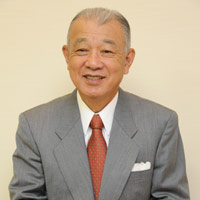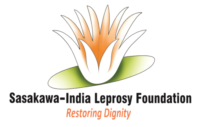
Mr Yohei Sasakawa
Chairman of The Nippon Foundation (TNF)
Mr Yohei Sasakawa is known worldwide for his relentless fight against Leprosy and the stigma against it. He has been actively engaged in the activities of Leprosy since 1981 and like his father before him, he has devoted his professional life-fighting leprosy not only in Japan but all over the world.
Since 2005 Mr Yohei Sasakawa has been the Chairman of The Nippon Foundation (TNF). Established in 1962, TNF is one of the largest private non-profit foundations in the world and focuses on social development and self-sufficiency, by improving public health and education, alleviating poverty, eliminating hunger and helping the disabled. From the very beginning, it has laid focus on fighting Leprosy.
Mr Sasakawa strongly believes that the fight against leprosy is like the two wheels of a motorcycle; the front wheel is the medical treatment, and the back wheel is that of social and economic rehabilitation of People affected by Leprosy. Only when the two work together, can the elimination of the disease in the true sense, be achieved – where not only the disease is cured but also does not carry any stigma that has plagued those affected. Mr Sasakawa has ensured that TNF has been actively involved in both the medical and socio-economic reintegration of People affected by Leprosy in the world.
One of the major contributions of TNF has been its role in reducing patient numbers by making the treatment – Multiple Drug Therapy (MDT) available, free to every person affected by Leprosy in the world over the 5-year period of 1995-1999. TNF provided free distribution of MDT, worth 5,000,000 USD, to countries through the WHO.
Mr Sasakawa has devoted a great deal of time and effort in fighting for leprosy in India. In 2005, Mr Sasakawa initiated the establishment in India of the National Forum (NF) of People Affected by Leprosy, now renamed as Association of People Affected by Leprosy (APAL), so that they could lead the fight for their acceptance in society and their inclusion in welfare schemes of the government.
In 2006 he established Sasakawa-India Leprosy Foundation (S-ILF), dedicated to the task of mainstreaming people affected by Leprosy so that they could move out of demeaning dependence on alms and begging and begin to earn their livelihood with dignity. Today, S-ILF is perhaps the only institution in the country to be solely and exclusively focused on the socio-economic integration of people affected by Leprosy. His vision is that APAL and S-ILF would work collaboratively for the social and economic rehabilitation of the people affected by Leprosy.
Mr Sasakawa has also been a very strong advocate of the elimination of leprosy at the global level. Since 2001, Mr Sasakawa is WHO Goodwill Ambassador for Leprosy Elimination and has visited many countries and met many heads of state, persuading them to give their attention to this biblical disease. In 2007, Mr Sasakawa was appointed as the Japanese Government Goodwill Ambassador for the Human Rights of Persons Affected by Leprosy. For this mission, Mr Sasakawa not only visits patients at leprosy sanatoriums and colonies around the world but also solicits cooperation from the heads of state to strengthen their leprosy control policies. He also works with media to help raise public awareness about the disease and associated stigma and discrimination. Through his persistent efforts since 2003, the UN General Assembly in December 2010 adopted a resolution endorsing the Principles and Guidelines to end Discrimination against People Affected by Leprosy which had been prepared by the UN Human Rights Advisory Committee. This resolution encourages governments and all institutions to give due consideration to these Principles and Guidelines in formulating policies and measures concerning persons affected by leprosy.
To raise international awareness of the problem, every year since 2006, Mr Sasakawa launches a Global Appeal to End Stigma and Discrimination against People Affected by Leprosy. This Appeal is endorsed by world leaders. The first Global Appeal was launched on 29 January 2006 in New Delhi and had Mr Ratan Tata, Mr Mukesh Ambani and Mr Keshav Mahindra, the largest corporate leaders, as its signatories.
Mr Sasakawa’s personal involvement in this work has earned him International recognition, including the WHO Health for All Gold Medal (1998), the International Leprosy Union’s Millennium Gandhi Award (2001), the Yomiuri International Cooperation Prize (2004), the International Gandhi Award (2006) and the Gandhi Peace Prize (2018).
Mr Sasakawa’s work extends beyond leprosy and includes the provision of traditional medicines to the remote areas in South East Asia, reducing poverty, increasing food security in Sub Saharan Africa, leadership and higher education, maritime safety and also Sino Japanese relations. He is the recipient of many awards and numerous honours by many countries, including Japan, Cambodia, Madagascar, the Czech Republic, France, Jordan, China, Belarus, Ukraine and the Russian Federation.
Mr Sasakawa has also written several books. His major publications on leprosy include the following:
- In 2014, Zanshin, Sekai no hansen-byo wo seiatsusuru (Remaining Mindful, Eliminating Leprosy Worldwide)
- In 2010, Fukano wo kanoni? Sekai no hansenbyotonotatakai (Making the Impossible Possible; the World’s Battle with Leprosy), Akashi Shoten, Tokyo, and
- In 2004, Sekai no hansen-byoganakunaru hi (The Day Leprosy is Eradicated from the World), Akashi Shoten, Tokyo, as well as many others on the subject.

